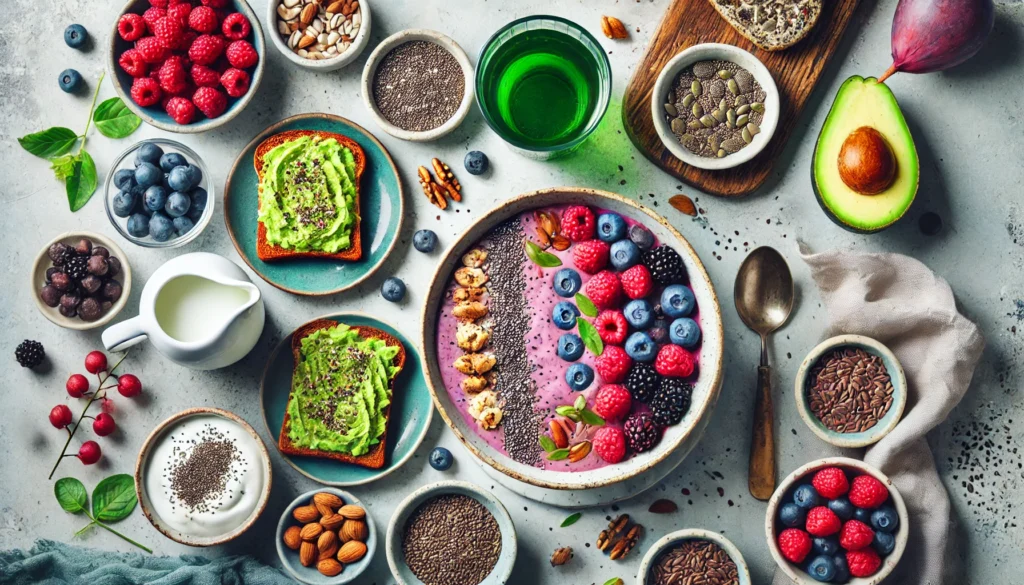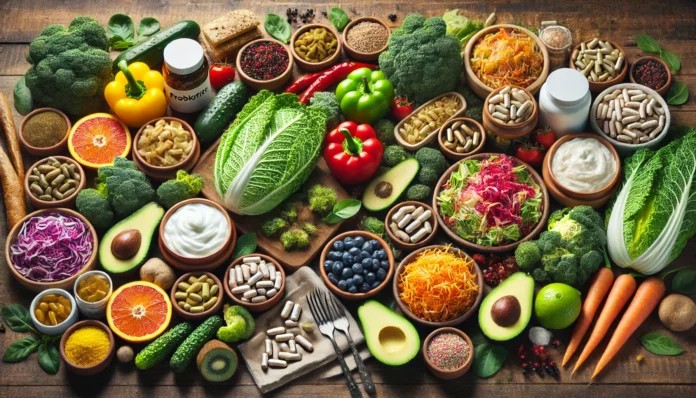Understanding the Link Between Gut Health and Weight Loss
Gut health is intricately connected to overall well-being, influencing everything from digestion to mental health. Research has shown that the gut microbiome—the diverse community of microorganisms residing in the digestive tract—plays a critical role in metabolism, nutrient absorption, and fat storage. When the gut is in balance, it can support healthy weight management by promoting efficient digestion, reducing inflammation, and regulating hunger hormones. Conversely, an imbalance in gut bacteria, known as dysbiosis, can contribute to weight gain, bloating, and metabolic disorders. Understanding how to restore gut health to lose weight is essential for those seeking sustainable and long-term weight management solutions.
You may also like: How to Improve Gut Health Naturally: Science-Backed Tips for a Stronger Microbiome
One of the primary ways the gut influences weight loss is through the regulation of appetite-controlling hormones, such as ghrelin and leptin. When gut bacteria are out of balance, they can disrupt these hormonal signals, leading to increased cravings and overeating. Additionally, an unhealthy gut can trigger chronic inflammation, which is linked to obesity and metabolic syndrome. By restoring gut health, individuals can enhance their body’s ability to process and metabolize food efficiently, thereby supporting weight loss goals in a natural and sustainable manner.
How to Restore Gut Health to Lose Weight
Restoring gut health involves a multifaceted approach that includes dietary modifications, lifestyle changes, and targeted supplementation. One of the most effective strategies is incorporating fiber-rich foods into the diet, as fiber serves as a prebiotic that nourishes beneficial gut bacteria. Foods such as whole grains, legumes, fruits, and vegetables help promote the growth of good bacteria while reducing inflammation and improving digestion. Fermented foods like yogurt, kimchi, sauerkraut, and kefir provide probiotics that help replenish beneficial bacteria and enhance gut function.
Reducing the intake of processed foods, refined sugars, and artificial sweeteners is another crucial step in restoring gut health. These foods can disrupt the balance of gut bacteria and contribute to inflammation, leading to weight gain and digestive discomfort. Instead, focusing on whole, nutrient-dense foods can help create a more favorable environment for gut bacteria to thrive. Hydration also plays a key role in gut health, as water supports digestion and helps maintain a healthy balance of gut bacteria.
Stress management is equally important in gut health restoration, as chronic stress can negatively impact gut bacteria and contribute to weight gain. Practicing mindfulness, engaging in regular physical activity, and prioritizing sleep can all support a healthier gut. Additionally, avoiding unnecessary antibiotic use and incorporating natural antimicrobials, such as garlic and oregano oil, can help maintain a balanced gut microbiome without disrupting beneficial bacteria.
Best Foods for Gut Health and Weight Loss
Certain foods have been identified as particularly beneficial for gut health and weight loss. These foods provide essential nutrients, support digestion, and help regulate metabolism, making them excellent choices for those looking to improve their gut microbiome while managing their weight effectively.
1. Leafy Greens: Spinach, kale, and Swiss chard are rich in fiber, antioxidants, and essential vitamins that promote gut health. These greens help nourish beneficial gut bacteria while reducing inflammation and supporting digestion.
2. Fermented Foods: Probiotic-rich foods such as yogurt, kefir, kimchi, and miso provide beneficial bacteria that enhance gut microbiome diversity. These foods can improve digestion, reduce bloating, and support a healthy metabolism.
3. Whole Grains: Oats, quinoa, and brown rice contain prebiotic fiber that feeds beneficial bacteria, promoting a balanced gut environment. They also help stabilize blood sugar levels, reducing cravings and supporting weight loss efforts.
4. Lean Proteins: Foods like salmon, chicken, and legumes provide high-quality protein that supports muscle maintenance and metabolism. Protein also helps regulate appetite by promoting satiety, reducing the likelihood of overeating.
5. Healthy Fats: Avocados, nuts, and olive oil contain monounsaturated and polyunsaturated fats that support gut health and reduce inflammation. These fats are essential for hormone balance and can aid in weight management.

Best Supplements for Gut Health and Weight Loss
In addition to a healthy diet, certain supplements can further enhance gut health and support weight loss. These supplements help restore balance to the gut microbiome, improve digestion, and promote metabolic efficiency.
1. Probiotics: Probiotic supplements contain beneficial bacteria that help restore gut flora balance, improve digestion, and reduce inflammation. Strains such as Lactobacillus and Bifidobacterium have been shown to aid in weight management by promoting fat metabolism and reducing appetite.
2. Prebiotics: These supplements contain non-digestible fibers that serve as food for beneficial gut bacteria. Prebiotics help maintain a healthy gut microbiome, enhance nutrient absorption, and support weight loss efforts.
3. Digestive Enzymes: Enzyme supplements assist in breaking down carbohydrates, proteins, and fats, improving digestion and reducing bloating. By enhancing nutrient absorption, these enzymes can support overall gut health and metabolic function.
4. Omega-3 Fatty Acids: Found in fish oil and flaxseed supplements, omega-3 fatty acids reduce inflammation and support gut lining integrity. They also play a role in regulating appetite and promoting fat metabolism.
5. Fiber Supplements: Psyllium husk and inulin are excellent fiber supplements that promote regular bowel movements, reduce bloating, and support gut bacteria diversity. They also help maintain satiety, preventing overeating and supporting weight management goals.
Gut Health and Weight Loss: A Holistic Approach
Achieving optimal gut health and weight loss requires a comprehensive approach that includes dietary adjustments, supplementation, and lifestyle modifications. By focusing on nutrient-dense foods, incorporating beneficial supplements, and managing stress levels, individuals can create a supportive environment for their gut microbiome. Consistency is key, as long-term dietary and lifestyle changes are necessary for sustainable gut health and weight management.
Regular physical activity further enhances gut health by promoting microbial diversity and improving digestion. Engaging in activities such as walking, yoga, and strength training can positively impact gut bacteria while supporting weight loss efforts. Additionally, prioritizing sleep and reducing exposure to environmental toxins can further enhance gut function and metabolic efficiency.

Frequently Asked Questions (FAQ) on Gut Health and Weight Loss
1. How does gut health influence weight loss?
Gut health plays a crucial role in weight management by regulating digestion, metabolism, and nutrient absorption. A diverse and balanced gut microbiome enhances metabolic efficiency, allowing the body to burn calories more effectively. Beneficial bacteria in the gut also produce short-chain fatty acids that help regulate fat storage and appetite hormones like ghrelin and leptin. When gut bacteria are imbalanced, it can lead to increased cravings, sluggish digestion, and inefficient energy use, all of which contribute to weight gain. Understanding how to restore gut health to lose weight is essential for maintaining a healthy body composition and preventing metabolic disorders.
2. What are the best foods for gut health and weight loss?
Some of the best foods for gut health and weight loss include fiber-rich vegetables, fermented foods, and lean proteins. Leafy greens, asparagus, and onions provide prebiotic fiber that nourishes good bacteria, promoting a balanced gut environment. Fermented foods such as kefir, kimchi, and yogurt introduce probiotics that support digestion and help reduce bloating. Lean proteins like salmon and chicken aid in muscle maintenance while minimizing excess fat accumulation. Including these foods in a daily diet enhances gut microbiome diversity and improves the body’s ability to maintain a healthy weight.
3. How do probiotics contribute to gut weight loss?
Probiotics are beneficial bacteria that improve digestion, reduce inflammation, and optimize nutrient absorption. Certain probiotic strains, such as Lactobacillus gasseri and Bifidobacterium breve, have been shown to promote gut weight loss by increasing fat metabolism and decreasing body fat accumulation. These bacteria can also reduce bloating and promote a flatter stomach by improving digestive efficiency. Probiotic supplements or probiotic-rich foods like sauerkraut and miso can help restore a healthy gut microbiome, leading to improved weight management and overall well-being. Regular probiotic intake can also enhance immune function and reduce gut-related disorders.
4. Can gut health affect emotional eating and cravings?
Yes, gut health directly influences emotional eating and food cravings due to its impact on brain chemistry. The gut produces neurotransmitters such as serotonin and dopamine, which regulate mood and appetite. When gut bacteria are imbalanced, the production of these chemicals can be disrupted, leading to increased cravings for sugary and processed foods. A well-balanced gut helps stabilize blood sugar levels and reduces emotional triggers for overeating. Incorporating the best foods for gut health and weight loss into a daily routine can naturally curb cravings and promote healthier eating habits.
5. Are there specific lifestyle habits that improve gut health and support weight loss?
Several lifestyle habits can enhance gut health while promoting weight loss, including stress management, regular exercise, and proper hydration. Chronic stress can negatively affect gut bacteria and lead to digestive issues, making relaxation techniques such as meditation and deep breathing essential. Regular physical activity increases microbial diversity and supports a healthy metabolism. Staying hydrated helps maintain gut lining integrity and ensures smooth digestion. Sleeping well also plays a vital role in gut health, as poor sleep disrupts the balance of hunger hormones and gut bacteria, making it harder to maintain a healthy weight.
6. What are the best supplements for gut health and weight loss?
The best supplements for gut health and weight loss include probiotics, prebiotics, digestive enzymes, and omega-3 fatty acids. Probiotic supplements introduce beneficial bacteria that improve digestion and metabolism. Prebiotics, such as inulin and resistant starch, feed good bacteria and promote gut balance. Digestive enzymes enhance nutrient absorption and prevent bloating, while omega-3 fatty acids reduce gut inflammation and improve fat metabolism. Combining these supplements with a balanced diet ensures optimal gut function and sustainable weight loss.
7. How long does it take to see results when improving gut health for weight loss?
The timeline for noticeable improvements in gut health and weight loss varies from person to person. Some individuals experience reduced bloating and improved digestion within a few days of dietary changes. More substantial weight loss and metabolic benefits typically become apparent after four to six weeks of consistent gut-friendly eating and supplementation. Long-term improvements in gut microbiome diversity can take several months, but sustained changes yield lasting benefits. Patience and consistency are key when working to restore gut health for effective weight loss.
8. Can an unhealthy gut contribute to weight gain even with a healthy diet?
Yes, an imbalanced gut can make it difficult to lose weight, even when following a healthy diet. Poor gut health can lead to chronic inflammation, insulin resistance, and inefficient digestion, all of which can hinder weight loss efforts. Harmful bacteria in the gut may extract more calories from food, leading to increased fat storage. Additionally, an unhealthy gut can disrupt hunger and satiety hormones, causing overeating or persistent cravings. Addressing gut health by incorporating the best foods for gut health and weight loss is essential for overcoming these barriers.
9. Are there any signs that indicate poor gut health is affecting weight loss efforts?
Several signs suggest that poor gut health may be interfering with weight loss, including bloating, frequent indigestion, and unexplained weight fluctuations. Other indicators include food intolerances, irregular bowel movements, and persistent sugar cravings. Chronic fatigue and skin issues, such as acne or eczema, can also be linked to gut imbalances. If these symptoms persist despite making healthy lifestyle choices, it may be necessary to focus on restoring gut health to lose weight more effectively. Identifying and addressing gut issues early can improve digestion and metabolic function, leading to better weight management outcomes.
10. What is the role of fiber in gut health and weight loss?
Fiber is essential for gut health and weight loss because it promotes regular bowel movements, supports beneficial bacteria, and enhances satiety. Soluble fiber, found in foods like oats, beans, and flaxseeds, slows digestion and helps stabilize blood sugar levels. Insoluble fiber, found in whole grains and vegetables, adds bulk to stool and prevents constipation. Fiber also serves as a prebiotic, feeding beneficial gut bacteria and promoting microbial diversity. By incorporating fiber-rich foods into daily meals, individuals can improve digestive health while naturally supporting weight loss.

Conclusion:
By integrating these expert-recommended strategies, individuals can take a proactive approach to improving their gut health while achieving their weight loss goals. A well-balanced gut not only contributes to a leaner physique but also enhances overall well-being, leading to improved energy levels, mental clarity, and digestive comfort. Investing in gut health is an investment in long-term health and vitality, making it a foundational aspect of any effective weight management plan.
gut microbiome balance, digestive wellness tips, probiotics for digestion, prebiotic-rich foods, healthy gut flora, weight management strategies, fiber for gut health, fermented foods benefits, metabolism and gut health, gut-friendly diet, gut-brain connection, inflammation and weight gain, natural weight loss remedies, holistic digestive health, microbiome and metabolism, best foods for digestion, gut bacteria and immunity, bloating relief foods, gut-friendly meal planning, digestive enzyme benefits
Further Reading:
How to Improve and Reset Gut Health
7 best foods for weight loss according to experts
What You Should Know About Gut Health and Weight Loss
Disclaimer
The information contained in this article is provided for general informational purposes only and is not intended to serve as medical, legal, or professional advice. While Health11News strives to present accurate, up-to-date, and reliable content, no warranty or guarantee, expressed or implied, is made regarding the completeness, accuracy, or adequacy of the information provided. Readers are strongly advised to seek the guidance of a qualified healthcare provider or other relevant professionals before acting on any information contained in this article. Health11News, its authors, editors, and contributors expressly disclaim any liability for any damages, losses, or consequences arising directly or indirectly from the use, interpretation, or reliance on any information presented herein. The views and opinions expressed in this article are those of the author(s) and do not necessarily reflect the official policies or positions of Health11News.


